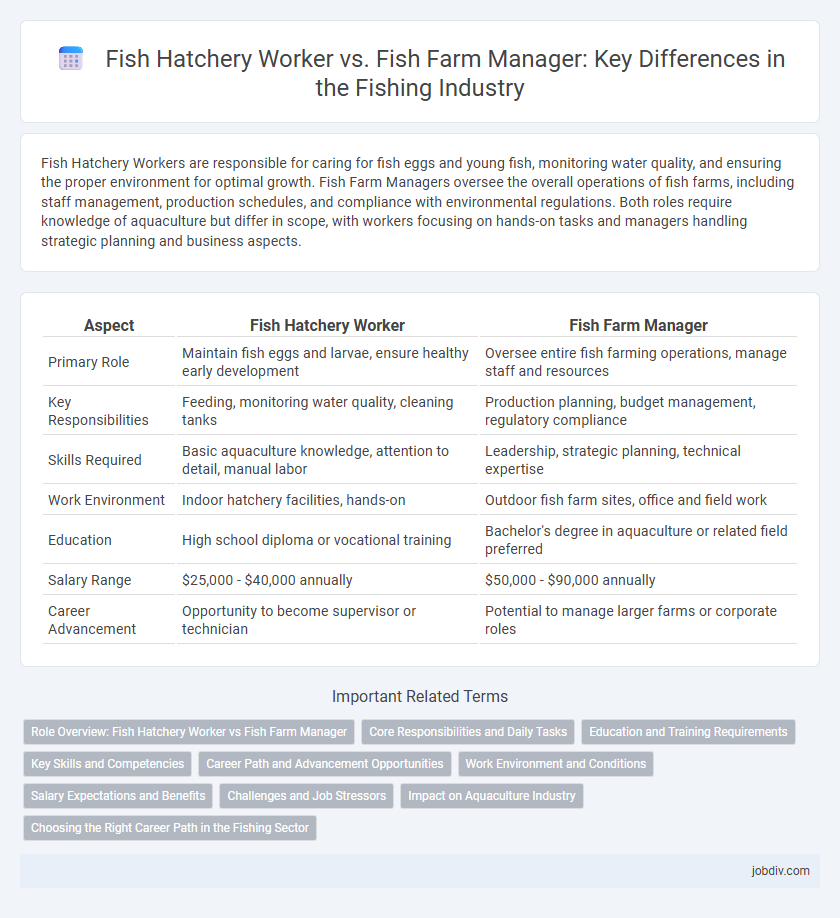Fish Hatchery Workers are responsible for caring for fish eggs and young fish, monitoring water quality, and ensuring the proper environment for optimal growth. Fish Farm Managers oversee the overall operations of fish farms, including staff management, production schedules, and compliance with environmental regulations. Both roles require knowledge of aquaculture but differ in scope, with workers focusing on hands-on tasks and managers handling strategic planning and business aspects.
Table of Comparison
| Aspect | Fish Hatchery Worker | Fish Farm Manager |
|---|---|---|
| Primary Role | Maintain fish eggs and larvae, ensure healthy early development | Oversee entire fish farming operations, manage staff and resources |
| Key Responsibilities | Feeding, monitoring water quality, cleaning tanks | Production planning, budget management, regulatory compliance |
| Skills Required | Basic aquaculture knowledge, attention to detail, manual labor | Leadership, strategic planning, technical expertise |
| Work Environment | Indoor hatchery facilities, hands-on | Outdoor fish farm sites, office and field work |
| Education | High school diploma or vocational training | Bachelor's degree in aquaculture or related field preferred |
| Salary Range | $25,000 - $40,000 annually | $50,000 - $90,000 annually |
| Career Advancement | Opportunity to become supervisor or technician | Potential to manage larger farms or corporate roles |
Role Overview: Fish Hatchery Worker vs Fish Farm Manager
Fish Hatchery Workers specialize in breeding, nurturing, and monitoring juvenile fish to ensure optimal growth and survival rates in controlled aquatic environments. Fish Farm Managers oversee the entire aquaculture operation, managing staff, production schedules, and health protocols to maximize fish yield and profitability. Both roles are critical in sustaining fish populations, but Fish Farm Managers have broader strategic responsibilities compared to the hands-on tasks of Fish Hatchery Workers.
Core Responsibilities and Daily Tasks
Fish hatchery workers primarily handle the incubation and care of fish eggs, monitor water quality, and ensure optimal conditions for fry development. Fish farm managers oversee the entire aquaculture operation, including staff supervision, budget management, and coordinating feeding schedules and harvesting processes. The hatchery role is more hands-on with direct fish care, while the farm manager focuses on operational efficiency and strategic planning.
Education and Training Requirements
Fish Hatchery Workers typically require a high school diploma or equivalent, with on-the-job training emphasizing fish care, feeding, and habitat maintenance. Fish Farm Managers often need a bachelor's degree in aquaculture, fisheries science, or a related field, combined with extensive experience in fish production management and regulatory compliance. Specialized certifications in aquaculture practices and environmental regulations enhance career advancement opportunities for Fish Farm Managers.
Key Skills and Competencies
Fish hatchery workers require expertise in larval rearing, water quality monitoring, and disease prevention to ensure healthy fish development. Fish farm managers demonstrate advanced skills in operational oversight, resource management, regulatory compliance, and staff supervision to optimize productivity and sustainability. Both roles demand knowledge of aquatic biology, fish nutrition, and environmental conditions, but managers prioritize leadership and strategic planning competencies.
Career Path and Advancement Opportunities
Fish Hatchery Workers primarily handle the breeding, nurturing, and monitoring of fish eggs and fry, serving as entry-level roles that provide foundational experience in aquaculture practices. Fish Farm Managers oversee entire aquaculture operations, including production planning, staff supervision, and regulatory compliance, requiring advanced knowledge and leadership skills often gained through progressive experience in hatchery roles. Career advancement from Fish Hatchery Worker to Fish Farm Manager typically involves gaining specialized certifications, practical management experience, and in-depth understanding of fish biology and farm economics.
Work Environment and Conditions
Fish hatchery workers primarily operate in controlled aquatic environments, such as indoor tanks and outdoor ponds, where maintaining water quality and monitoring fish health are crucial. Fish farm managers oversee larger-scale operations, managing staff and coordinating activities across extensive outdoor facilities, often facing variable weather conditions and physical demands. Both roles require adherence to safety protocols, but managers typically handle administrative responsibilities alongside hands-on tasks in dynamic, water-based settings.
Salary Expectations and Benefits
Fish Hatchery Workers typically earn an average salary ranging from $28,000 to $40,000 annually, with benefits including health insurance and seasonal employment opportunities. In contrast, Fish Farm Managers command higher salaries between $50,000 and $75,000 per year, reflecting greater responsibilities such as overseeing daily operations and staff management, along with enhanced benefits like bonuses and retirement plans. Both roles contribute to aquaculture sustainability, but management positions offer more financial stability and career growth within the industry.
Challenges and Job Stressors
Fish Hatchery Workers face challenges such as maintaining optimal water quality, monitoring fish health, and preventing disease outbreaks in controlled environments. Fish Farm Managers encounter higher stress due to overseeing large-scale operations, managing staff, complying with environmental regulations, and addressing unexpected issues like equipment failure or fluctuating market demand. Both roles demand adaptability and problem-solving skills but differ significantly in responsibility scope and decision-making pressure.
Impact on Aquaculture Industry
Fish hatchery workers play a crucial role in the aquaculture industry by ensuring the successful breeding, hatching, and early development of fish, directly influencing stock quality and sustainability. Fish farm managers oversee the entire operation, from fish health management to production efficiency, driving profitability and large-scale output. Together, their combined efforts enhance industry growth, resource management, and environmental impact mitigation in aquaculture.
Choosing the Right Career Path in the Fishing Sector
Fish hatchery workers specialize in breeding and raising fish in controlled environments to support wild populations and commercial fisheries, requiring hands-on skills in monitoring water quality and fish health. Fish farm managers oversee operations of aquaculture facilities, emphasizing strategic planning, resource management, and staff supervision to maximize production efficiency and sustainability. Choosing between these roles depends on interest in direct animal care versus leadership and operational responsibilities within the fishing sector.
Fish Hatchery Worker vs Fish Farm Manager Infographic

 jobdiv.com
jobdiv.com